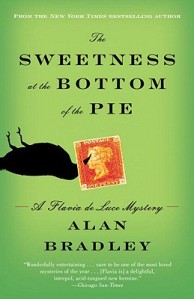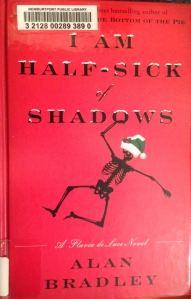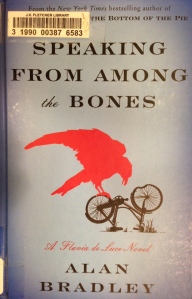Tags
Alan Bradley, Flavia de Luce, I want a bicycle called Gladys, Margery Allingham, postwar England, Sam Mendes, The Sweetness at the Bottom of the Pie, village eccentrics
A while back (when? who knows? who cares?), one of the friendly librarians at my local library noticed I was a big mystery reader and we started talking about series we liked. I told her I wasn’t much for American mysteries. She suggested I try the Flavia de Luce series by Alan Bradley – it featured an 11-year-old girl as a detective in a post-war English village.
“I’m not big on those twee, cutesy mysteries where kids or cats solve crimes,” I said dubiously.
“Just try it,” she said.
And, eventually, I did. And you know what? She was right. I’m hooked. The first book, The Sweetness at the Bottom of the Pie, introduces us to Flavia de Luce, a brilliant if somewhat warped 11-year-old living in a crumbing mansion called Buckshaw, outside a  remote English village in 1950. And very quickly we learn the reason she is a strange ‘un – her mother was lost in a mountaineering accident in Tibet when she was a baby, her father hides his grief (and himself) in his study with his vast postage stamp collection while also hiding from the tax collector, and her older sisters regularly torment her, both physically and emotionally.
remote English village in 1950. And very quickly we learn the reason she is a strange ‘un – her mother was lost in a mountaineering accident in Tibet when she was a baby, her father hides his grief (and himself) in his study with his vast postage stamp collection while also hiding from the tax collector, and her older sisters regularly torment her, both physically and emotionally.
Flavia takes refuge in the east wing of Buckshaw in her great-uncle’s world-class chemistry lab, which she discovered intact years earlier and promptly took over. Her knowledge of chemistry is unmatched in the village, and she takes great pleasure in concocting compounds, especially poisons.
Whenever I’m a little blue I think about cyanide, whose color so perfectly reflects my mood.
“Cyanide…strychnine…arsenic.” I spoke their names aloud These were what I called my “calming chemicals.”
In The Sweetness of the Bottom of the Pie, Flavia comes up against her first murder. One day she finds a dead blackbird on her front doorstep, a postage stamp – one of her father’s? – stuck on its beak. The next morning she finds a man lying in the garden and watches him die…but not before he says something cryptic. This is the same man who was arguing with her father in his study the night before. Is Flavia scared of a dead man? No.
I wish I could say I was afraid, but I wasn’t. Quite the contrary. This was by far the most interesting thing that had ever happened to me in my entire life.
So Flavia embarks on solving the murder, a task which is made all the more urgent when her father is arrested for the crime. She must outwit Inspector Hewitt, the  policeman who’s investigating the case and has locked up her father, to figure out who the killer is. Can she do it? Of course.
policeman who’s investigating the case and has locked up her father, to figure out who the killer is. Can she do it? Of course.
Flavia marshals all the skills in her possession to solve this crime and the murders in the ensuing four books. Aside from her brilliance in chemistry, she effectively uses the fact that she’s 11 and can pretty much go anywhere in her local village of Bishop’s Lacey (on her trusty bicycle, Gladys), without garnering notice or comment. She doesn’t hesitate to leverage others’ prejudices about the innocence of children. And she’s an unrepentant snoop.
Whether it’s a whole house or just a single drawer, there’s a deep and primitive pleasure that comes from snooping through someone else’s belongings. Although part of me was scared silly, the greater part was having the time of my life. I wanted to whistle, but I didn’t dare.
While Flavia is frustrated with Inspector Hewitt, both for arresting her father and for trying to keep her out of his investigation, she also admires him greatly, and is  completely besotted with his wife, Antigone. She dreams of getting an invitation to their house for tea to talk about crime with Hewitt and stare lovingly at his wife. (This actually happens in the third book, with disastrous results.) Her love of the Hewitts is not at all surprising, given the vagaries of her own family situation at Buckshaw.
completely besotted with his wife, Antigone. She dreams of getting an invitation to their house for tea to talk about crime with Hewitt and stare lovingly at his wife. (This actually happens in the third book, with disastrous results.) Her love of the Hewitts is not at all surprising, given the vagaries of her own family situation at Buckshaw.
Looking back at what I’ve written so far, it may come across that Flavia is too twisted and annoying to root for, that her father is terribly neglectful, and that her sisters are complete ogres. But this is really far from the case. As much as Flavia is so focused on poisons and snooping, she’s also a compelling character, full of empathy and the occasional penetratingly wise insight about her family and neighbors. Her father is often absent, even when he’s at home, but he makes it clear how much he loves his daughters – and how much he still grieves for his wife – at key moments. And her sisters may torment her, but they’re teenagers and human, who also miss their mother and show it in their own ways.
Flavia’s creator, Alan Bradley, is Canadian but paints a vivid picture of a 1950s English village whose inhabitants face the privations of postwar Britain and personal tragedies with a stiff upper lip and a boatload of eccentricities. Margery Allingham would be proud. It has been so enjoyable to read these books, and more than enjoyable, it’s been affecting. Somehow Flavia & Co have crawled right under my skin, poisons and all.
EPILOGUE: In doing some websurfing for this post, I find that noted director Sam Mendes has optioned the Flavia books for a UK television production that is supposed to air sometime in 2015. While I am fairly excited about this, I’m also fairly nervous about it, too. What if they try to make Flavia too cute or likable? What if they screw around with the stories? It wouldn’t be the first time TV or movies have messed around with a perfectly good book. But it could be really good, too – I have more confidence in a UK production than a US one, anyway. We’ll see what happens.

How can you do this? I’ve already got too many books coming out of my ears!
Because I’m *evil*, heh heh heh…
No, seriously, I can relate. The pile on my nightstand has reached hazardous proportions.
Does that mean the bedside lamp balanced on the pile is rapidly nearing the ceiling? That’s certainly the case with me.
The lamp isn’t nearing the ceiling, but the book pile is almost as tall as the lamp. One night it’ll fall on my head while I’m sleeping.